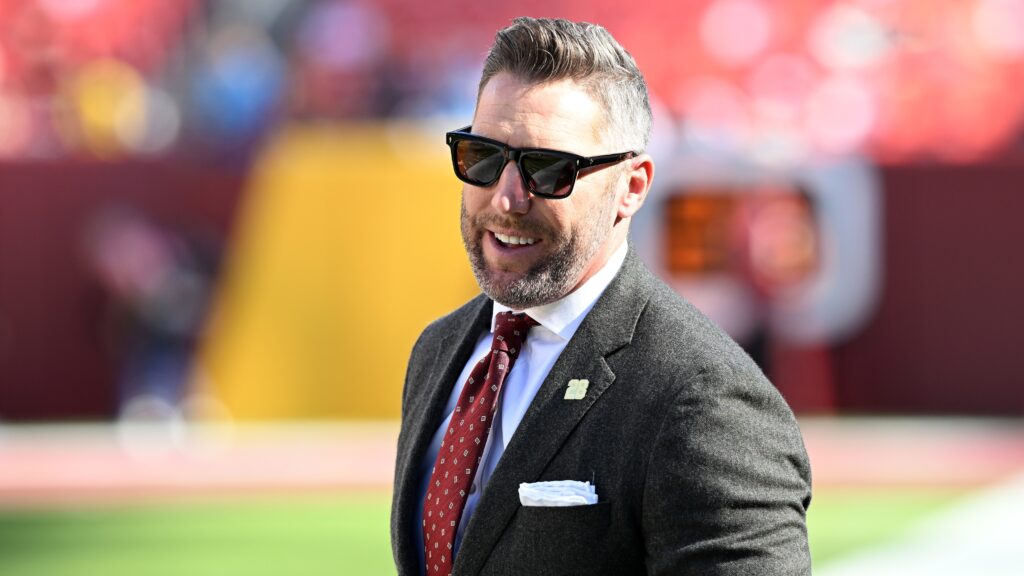Adam Peters reached the peak of the NFL as soon as he entered the league. After being hired by the New England Patriots as a scouting assistant in 2003, he was part of a staff that won back-to-back Super Bowls.
It had mostly been smooth sailing for Peters when Matt Russell, who worked alongside him as a Patriots scout, offered a new opportunity in 2009. Former Patriots offensive coordinator Josh McDaniels had just been hired as coach of the Denver Broncos, and he brought on Russell as the director of college scouting. Russell convinced Peters to come with him.
The situation in Denver quickly went off the rails. McDaniels was fired after just 28 games, and the Broncos finished 4-12 in 2010.
That came with anxiety for Peters. He had just left a stable situation, uprooted his life and relocated in search of career advancement. Suddenly, he entered a precarious spot in which he wasn’t sure who his boss would be or whether he would still have a job. Instead of getting lost in a situation he couldn’t control, he focused on the work.
Sign up for our newsletter, For Old D.C. It’s a Commanders newsletter for Washington sports fans, including news, analysis and trivia from Scott Allen.https://t.co/DlUDxAhRwl
— Post Sports (@PostSports) October 16, 2025
“He handled it great,” former Broncos general manager Brian Xanders said of Peters, now the Washington Commanders’ GM. “Each team does face adversity, even the Super Bowl winner. You always find out that you end up on the better side of that valley as you climb out of it.”
When John Elway replaced Xanders as GM in 2011, a meeting was held that included coach John Fox, Peters and other scouts. Elway had been a Hall of Fame player, but running a front office was new. In getting him up to speed, they went through the roster and mapped out a plan to turn things around.
Peters helped bring that plan to fruition. Denver made the playoffs five seasons in a row starting in 2011 and won Super Bowl 50 in the 2015 season. Going through that process taught Peters how to overcome adversity and find success.
“His respect and standing in the company really never wavered,” former Broncos executive Mark Thewes said. “[Elway] respected his views, and it just blossomed from there. You could see it early: He was destined to be at a higher level.”
Peters is trying to replicate that success with the Commanders, who will host the Broncos (9-2) on “Sunday Night Football.” Things went better than imagined in his first year on the job, with Washington going 12-5 and reaching the NFC championship game. But in Year 2, Washington (3-8) is struggling mightily. The Commanders’ belief that Peters can turn things around stems from his track record of doing just that.
Success begets expectations
In drafting quarterback Jayden Daniels and bolstering the roster with short-term, cheap and savvy veteran acquisitions, Peters’s first offseason with the Commanders went brilliantly. As Washington went on to become one of the best teams in the NFL, the praise kept coming.
Naturally, the Commanders’ struggles this year have led to a more careful examination of his roster-building. Outside of Daniels, there’s not another clear hit from the nine draft picks — including six in the first three rounds — he made in 2024.
Because of trades to acquire cornerback Marshon Lattimore, wide receiver Deebo Samuel Sr. and left tackle Laremy Tunsil, Washington had just five draft picks in 2025. Right tackle Josh Conerly Jr. has settled in, cornerback Trey Amos was playing at an average level before suffering a broken fibula, and wide receiver Jaylin Lane has been an effective punt returner, but it remains too early to evaluate the rookie class.
The trades for Samuel and Tunsil have paid dividends. And defensive tackle Javon Kinlaw, the lone significant free agent acquisition this past offseason, has played well. Peters’s major blunder was trading for Lattimore, who underperformed in 11 games with the team before suffering a season-ending ACL injury and could be a salary cap casualty in the offseason.
Washington is set to have plenty of cap space in 2026, and Peters has provided enough evidence to believe he will spend that money wisely. Ironically, the area where he most needs to prove himself is where he made his name as an executive: the draft.
It could be a challenge for Peters to pull that off next spring. Although the Commanders look to be headed toward a high first-round pick, they own just two selections in the first four rounds. That’s because they traded their second and fourth-round picks in the deal for Tunsil.
Peters could bolster his draft capital with other trades, but the Commanders are positioned to have little margin for error. That comes with additional pressure.
In his previous stops, Peters was part of staffs that navigated those types of situations well. He proved adaptable and learned from his mistakes.
Regardless of how a season plays out, Peters undergoes an evaluation process every offseason. That includes assessing his staff, and evaluating himself, with a critical lens. While he notes the positives, he tends to learn more from breaking down what went wrong.
He’ll analyze how the front office and coaching staff work together, what they value in the scouting process and their approach to free agency, contract negotiations and the draft.
“He’s smart enough to take the good, eliminate the bad and kind of develop what he wants to do in Washington,” said Russell, now an executive with the Philadelphia Eagles. “He’s got the confidence to do that as opposed to [saying], ‘I’m going to do it this way.’”
Growing responsibilities
Less than a year after graduating from UCLA, Peters was brought in by the Patriots. Despite his lack of experience at 23, he didn’t lack conviction.
“Adam, even as a young guy, was confident in his evaluations and confident in conversations that he’d have with people,” Russell said. “And it didn’t matter if it was another in-house guy or all the way up to the owner, he was going to tell you what his opinion was. That can be hard to find.”
That remained the case during his time in Denver. He stood out with his scouting and interpersonal skills. And while he had strong opinions, he remained open to other perspectives.
“He gets along with everybody,” Russell said. “It doesn’t matter if he’s in the South or out West or whatever situation he’s in socially; he relates well to people, and he treats people right. … You can’t say that about everybody.”
Peters, who grew up in the Bay Area city of Mountain View, California, was a skilled communicator who could articulate his thoughts in a concise manner, collaborate effectively and easily relate to others. He was a core member of draft meetings and worked well with fellow executives and coaches at the Broncos’ facility, but he was also adept at gathering information while on the road.
As an evaluator, Peters took a balanced approach. He factored in on- and off-the-field traits and tended to focus on what a player could do rather than harp on what he couldn’t.
“It’s kind of scouting with the glass half-full as opposed to half-empty,” Russell said. “We could all go into schools and slaughter every guy you see for this or for that. Adam had a unique way of saying: ‘Hey, look, this is what this guy can do. Here’s his redeeming qualities.’ … Adam was always able to provide a real big sort of snapshot from 30,000 feet. That sort of separated him from other guys.”
Peters was part of the staffs that drafted nine starters on the Broncos’ Super Bowl-winning team, including star pass rusher Von Miller and wide receiver Demaryius Thomas.
Thewes described Peters as “integral” to the Broncos’ decision-making process in the draft, but he wasn’t making the final call on any of their picks. He also wasn’t involved in the pro scouting that led to free agent and trade acquisitions. To become more well-rounded, he would need more responsibility.
That arrived after the Broncos won the Super Bowl. John Lynch had just been hired as the San Francisco 49ers’ general manager, and his first hire was Peters as vice president of player personnel. Much like Elway, Lynch was a first-year GM who leaned on an experienced front office. Across four seasons in that role and three years as assistant GM, Peters was key in the 49ers going from afterthoughts to Super Bowl contenders.
Peters aimed to remain calm, collected and consistent. He regulated his emotions by focusing on the process, not the results.
When he helped the Commanders turn things around so dramatically, it felt as if he could do no wrong. With newfound doubt surrounding the franchise, he has to prove himself again.
Internally, that’s how Peters always views his job. With as much year-over-year turnover as there is in the NFL, there’s never room to let up.
The post Adam Peters could do no wrong. Now the GM can show how he handles adversity. appeared first on Washington Post.




